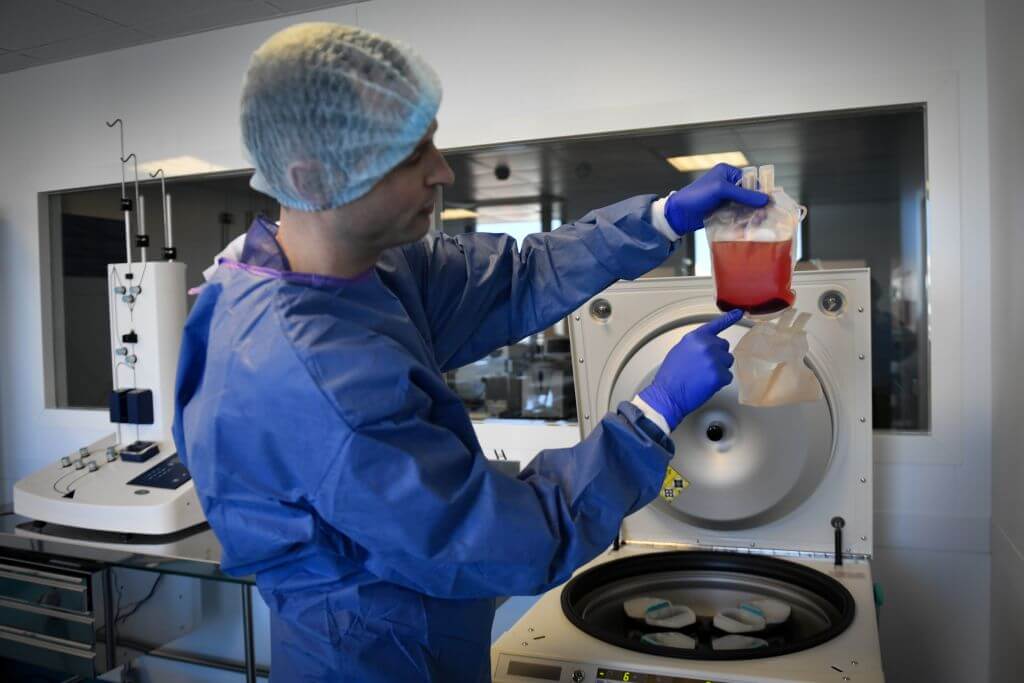Anti-GPRC5D chimeric antigen receptor (CAR) T-cell therapy can produce responses in patients with relapsed or refractory multiple myeloma (MM), according to a phase 2 trial published in the Journal of Clinical Oncology.
Most of the patients studied had a response to anti-GPRC5D CAR T-cell therapy, including all patients who had previously received anti-BCMA CAR T-cell therapy.
This phase 2 study enrolled 33 patients with relapsed/refractory MM. The patients’ median age was 58 years (range, 39-70), and 55% were men. They had received a median of 4 prior lines of therapy (range, 2-12), and 9 patients had prior anti-BCMA CAR T-cell therapy.
The patients underwent lymphodepletion with fludarabine and cyclophosphamide. They were also randomly assigned to receive all trans retinoic acid (ATRA) twice daily from day -2 to day 21. On day 0, patients received a single infusion of anti-GPRC5D CAR-T cells (target dose, 2 x 106/kg).
The median follow-up was 5.2 months. The overall response rate was 91%. Eleven patients had a stringent complete response, 10 had a complete response, 4 had a very good partial response, and 5 had a partial response. Three patients had disease progression after achieving a response.
There was no significant difference in response rates between patients who received ATRA and those who did not.
All 9 patients who had prior anti-BCMA CAR T-cell therapy responded to anti-GPRC5D CAR T-cell therapy. Four patients had a complete response. There was no significant difference in response rates between patients who had received anti-BCMA CAR T-cell therapy and those who had not.
A total of 26 patients achieved minimal residual disease negativity in the bone marrow. One of these patients later had disease progression.
The most common adverse events (AEs) were hematologic in nature. Grade 3 or higher hematologic AEs included neutropenia (100%), anemia (52%), and thrombocytopenia (45%). However, 88% of patients had cytopenias before they underwent lymphodepletion.
A majority of patients (76%) had cytokine release syndrome (CRS), but there were no cases of grade 3 or higher CRS. All cases of CRS resolved with conventional treatment.
Neurotoxicity occurred in 3 patients (9%). One patient had grade 2 immune effector cell-associated neurotoxicity syndrome (ICANS), and 1 had grade 3 ICANS. In both cases, ICANS resolved after treatment with glucocorticoids.
The researchers concluded that anti-GPRC5D CAR T-cell therapy had “an encouraging clinical efficacy and manageable safety profile” in this study.
“For patients with MM that progressed after anti-BCMA CAR T-cell therapy or that is refractory to anti-BCMA CAR T cell, anti-GPRC5D CAR T-cell therapy might be a potential alternative option,” the researchers wrote.
Disclosures: Some study authors declared affiliations with biotech, pharmaceutical, and/or device companies. Please see the original reference for a full list of disclosures.
Reference
Xia J, Li H, Yan Z, et al. Anti–G protein–coupled receptor, class C group 5 member D chimeric antigen receptor T cells in patients with relapsed or refractory multiple myeloma: A single-arm, phase Ⅱ trial. J Clin Oncol. Published online March 7, 2023. doi:10.1200/JCO.22.01824
This article originally appeared on Cancer Therapy Advisor
